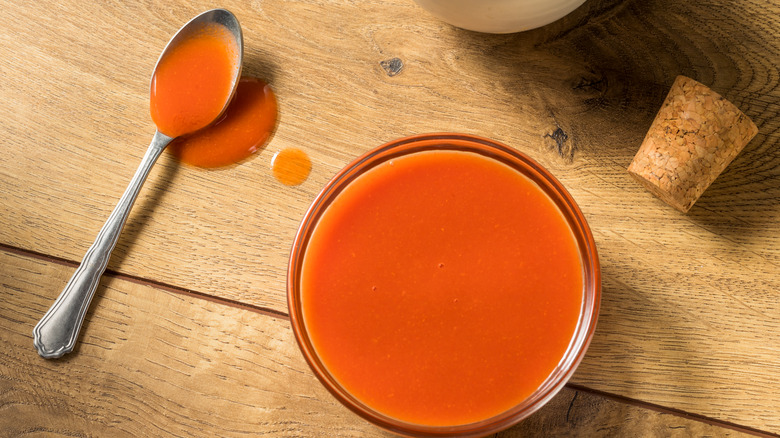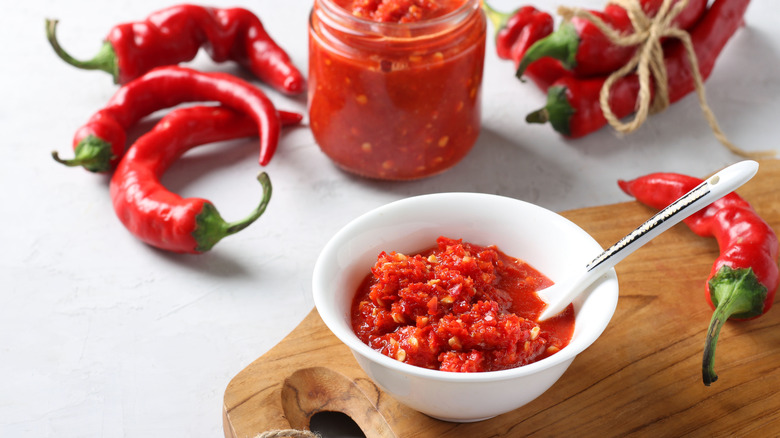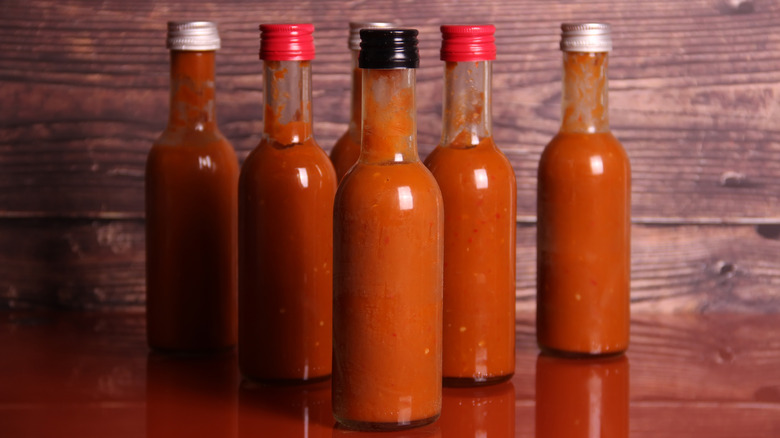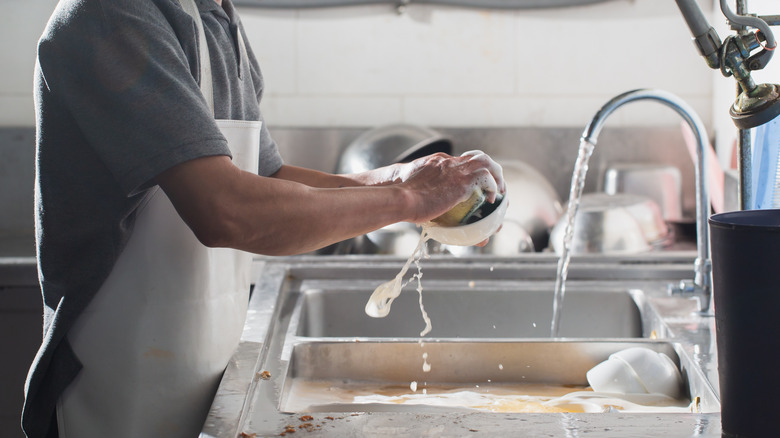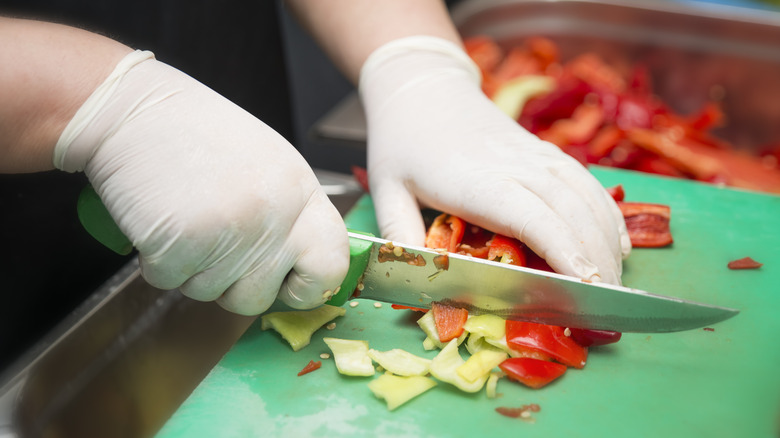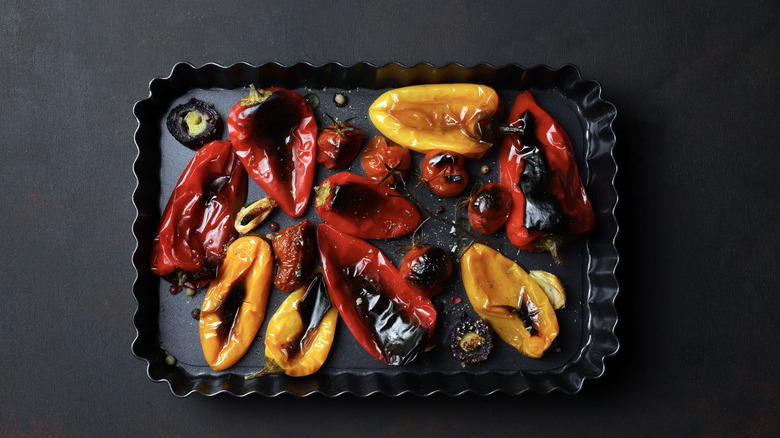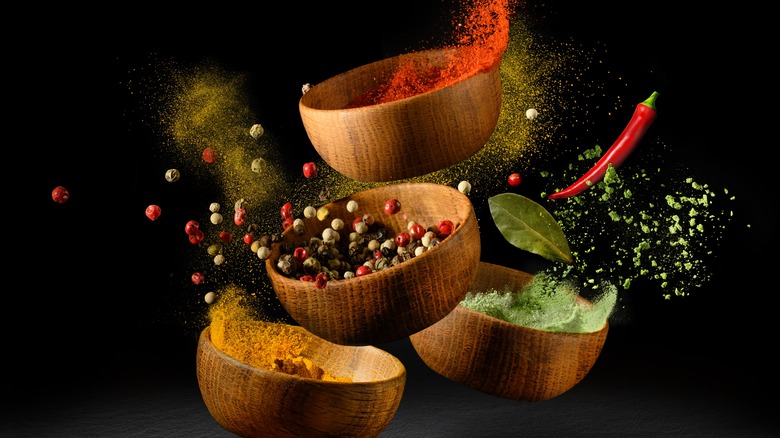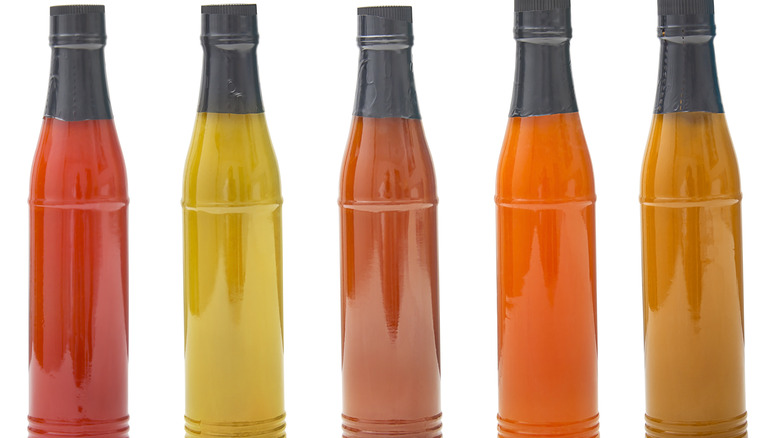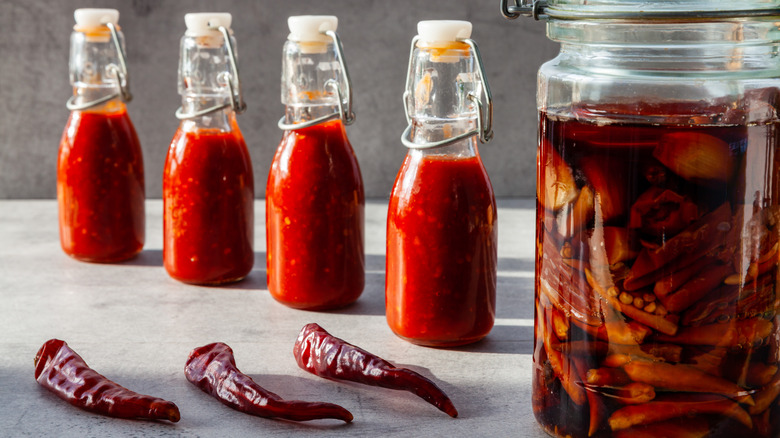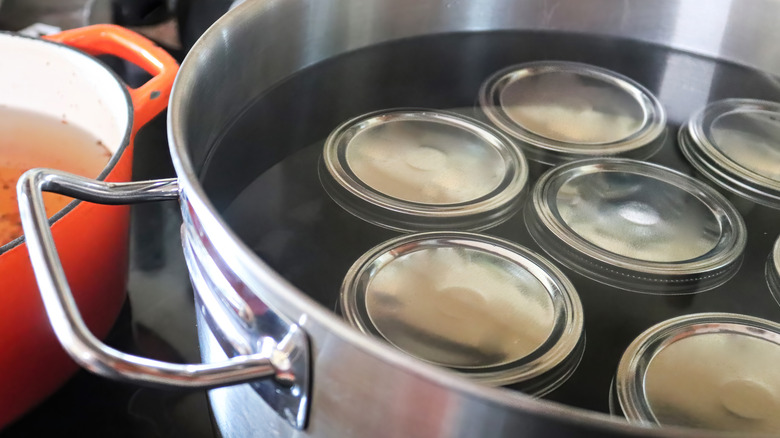11 Mistakes To Avoid When Making Hot Sauce
Hot sauce is an incredible condiment. It can add spice and flavor to any dish: It is no wonder that hot sauce can be found in different forms all over the world. There are plenty of delicious store-bought hot sauce brands out there, and many of these offerings are quite delicious. But there is something so satisfying about making hot sauce yourself.
And hot sauce is not particularly difficult to make. Once you know the proper technique and methods, you can concoct the hot sauce of your dreams, develop the heat levels you want, add any flavors, and have it suit your style. You can also create and bottle hot sauce to give as homemade presents.
While the process is not overly complicated, there are some classic pitfalls you will want to avoid when making hot sauce. Avoiding these key mistakes will help you make the perfect hot sauce while also staying safe.
1. Not knowing the different types
Many people do not realize that there are a lot of different types of hot sauce. Yes, some people know hot sauces are available in different flavors, ones that use different spices or different kinds of peppers, for example. But the world of hot sauce is vast. So before you make your first batch of hot sauce, it is important to understand the different types so that you know what you are making.
One of the biggest differences in style is that some hot sauces are fermented while others are not (via Pepper Scale). Unfermented hot sauce is made by mixing mashed peppers and vinegar. Fermented hot sauce is slightly more complex and uses crushed peppers in a salt brine to activate enzymes that will help break down the sauce.
Fermented hot sauces are thought to have a more complex flavor but also tend to be less spicy than their unfermented counterparts. However, many popular hot sauces are fermented, so even though they take longer, it may be worth the effort.
It is also worth noting that some hot sauces are cooked, whereas others are not. Condimaniac explains that fermented hot sauce is often left uncooked, whereas unfermented sauce is cooked. Cooking the hot sauce allows the ingredients to blend together in new ways and may offer a sweeter flavor to the hot sauce. The final decision is up to you, but it is important to know the pros and cons of each style.
2. Not understanding the different styles of hot sauce
Once you understand that there are different types of hot sauces, then it is essential to realize that there are different styles as well. These styles will determine flavor, color, and texture. For example, Louisiana-style hot sauce tends to be thin and vinegary. Frank's Red Hot Sauce is a Louisiana-style sauce. Sriracha, on the other hand, has a thick, smooth consistency: Huy Fong Sriracha is a popular example.
Hot sauces vary by region and geography. Some use specific herbs and spices that may be found in that culture's cuisine, while some use different kinds of peppers. Once you know what it is you are trying to make, making your hot sauce journey will be much easier.
You will be able to seek out recipes for exactly what you are hoping to make and will know that the end result is something you will want to eat. If you are going to make hot sauce, you want to avoid making a style of hot sauce that does not suit your preferences or your culinary requirements.
3. Not understanding the science of hot sauce
A common adage is that cooking is a science. This is true, and understanding the science behind what you are making will help you succeed. This does not mean you must understand all the nitty gritty on a molecular level, but it does mean understanding the process.
For example, for a fermented hot sauce, it is crucial to understand that bacteria break down the ingredients to give it a distinct flavor and texture. This will help you to appreciate why it is important to pay attention to what comes in contact with your jars and why you have to wait before eating fermented hot sauce.
It is also important to understand what capsaicin is and how it works. Capsaicin is found predominantly in the seeds of peppers (via Science of Cooking). Therefore, removing the seeds will affect not just the texture of the hot sauce but the heat as well. This can be a positive or negative depending on your desired outcome, which is why it is important to find the correct balance and prep your peppers correctly before making hot sauce.
4. Not sterilizing your jars
No matter what style of hot sauce you are making, it is important to make sure you are using clean jars; this becomes more important when making a fermented-style hot sauce, as your mash will be sitting sealed in a jar specifically designed to grow bacteria, which may not be beneficial.
As an article on 1 Million Women explains, fermenting hot sauce in jars that are not adequately sterilized can lead to disastrous results, the least of which is moldy unusable hot sauce. The jars can literally turn into explosives as the pressure can build up before it finally bursts.
Remember that fermentation is the same process that adds bubbles to things such as beer. What happens if you shake a carbonated drink too much? That's right: It explodes everywhere. You want to minimize the outside bacteria as much as possible so that there are no surprises.
To ensure your hot sauce turns out well and lasts as long as possible, make sure you sanitize all the equipment your sauce comes in contact with, especially the bottles in which you intend to store your hot sauce.
5. Not wearing gloves
Safety first! Unless you want to feel the burn, we recommend you wear gloves, especially during the cutting process. Look, "hot" is literally in the name of hot sauce. Even if you are using relatively mild peppers, they can still bring the heat. That is because spicy peppers contain a chemical called capsaicin.
Capsaicin is what gives peppers their heat, and it has the ability to cause pain. While most people think of peppers as tasting hot, you can feel the effects of capsaicin outside your mouth. If you do not wear gloves while handling peppers, you will likely feel a burning sensation on your hands.
On that note, you will also want to avoid touching your face or any other sensitive areas with hands that have recently come in contact with peppers or hot sauce. This means wearing gloves and washing hands thoroughly before doing something like taking out contacts.
The excellent news is that capsaicin may hurt, but it does not cause any physical damage. Still, there is no reason to inflict more pain on your body than is absolutely necessary. So wear gloves, wash your hands, and avoid touching your face.
6. Making very spicy hot sauce indoors
Did you know that capsaicin can become airborne and can make the air hurt? Many people have had the experience of cutting onions and having their eyes begin to fill with tears. Well, a similar thing can happen when cooking peppers. When you cook peppers, they break down and release more capsaicin. This can be ideal from a flavor standpoint but can cause problems in an unventilated kitchen.
As one Reddit commenter noted, their rookie mistake of cooking peppers in their kitchen led them to be "gassed out." The air literally became painful to breathe. This can become increasingly uncomfortable the spicier your peppers are.
If you want to make a cooked hot sauce, a good place to start is turning on a kitchen venting fan and opening up any windows in the kitchen. However, even this may not be enough for large batches or particularly spicy peppers. The Reddit Commenter recommends cooking on a camp stove outside. You can also try roasting peppers on a grill for a cooked, smoky flavor.
7. Using old spices
If you are making hot sauce, we assume you are doing so to add flavor to foods, whether you're considering making a subtle pepper flavor or a more complex one. Therefore, chances are that you will be using some dried spices in whatever mix you make. If you are using spices, make sure that they are still within their appropriate shelf life. Otherwise, you will be disappointed by the lackluster flavor.
Most dried spices do not expire in the way we think. Rather than going rancid or making us sick, spices past their prime simply begin to lose their flavor (via Healthline). This can cause food to seem less flavorful despite the addition of spices. Pre-ground spices have a shelf life of about two to three years, whereas whole spices may last up to four. The one exception is salt, which does not expire.
To check your spices, first look for a "best by" date. If you are still unsure, test as a small portion by pouring some into your hand and giving it a whiff. If the smell is unimpressive, it is likely time to replace that spice. A good rule of thumb is that if you do not remember when you bought spices, it is time to replace them.
8. Making your sauce too hot
We know "hot" is in the name, but making a hot sauce so spicy that you find it inedible or enjoyable is a waste of your time and effort. One of the first decisions you make when making a hot sauce is choosing the correct pepper for the mix.
You may love the flavor of one pepper, but in concentration, you may find it too hot. We suggest checking the Scoville scale, a measurement of heat in peppers, to get a better feel for what peppers may be too hot for you. Remember, heat preference is subjective, and what you may think is too hot, someone else might like, so do not fully rely on recipes provided by others.
If you do find that your hot sauce is too hot, there are a couple of tricks you can try to temper the heat. Pepper Scale recommends adding some kind of fat, such as butter or olive oil, as fat helps bind capsaicin. You can also try adding additional non-pepper ingredients to water it down. If all this fails and your hot sauce is simply too hot, give it to someone you never want to see again.
9. Not being creative
It is tempting to follow each recipe strictly. When you are first starting out your hot sauce-making journey, this can be incredibly helpful. Once you get into the rhythm of it and understand how to make hot sauce, it is time to branch out and see what you can create on your own.
This means trying whatever flavor combinations sound good to you or suit a specific need. Look into using different peppers or combinations of peppers. Try adding sweet ingredients, even fruit, to the mix. Garlic and other spices can make great additions, as can other pickled vegetables.
This can also mean leaving out ingredients. If you find a recipe that you really want to try but that calls for an ingredient you do not like, leave it out or find a substitute. Many people hate cilantro, for example. Just because one recipe calls for it does not mean you have to use it.
You are completely in charge of your own hot sauce destiny. Do you want a smoky peach and jalapeno hot sauce? You can do it. Do not worry about what other people think. This is for you to make yourself and your taste buds happy.
10. Not waiting long enough
This next mistake is primarily for fermented hot sauce. Time is the most important ingredient if you want your hot sauce to turn out the way you hope. Without time, you will simply have some ground-up peppers. For fermented hot sauces, the peppers must sit (usually mashed in some way with salt) until they become tangy and fermented.
Fermentation may happen faster in higher temperatures and slower in cold weather. Once again, this is why understanding the science behind hot sauce is so important. The signature tang usually develops in one to two weeks. If you try to stop it beforehand, you will just have slightly salty peppers.
Fermentation is also part of what helps preserve hot sauce and help keep it shelf stable, so you would be doing yourself a disservice moving on to the next step before your peppers are fully ready. We know it is difficult. It is hard to be patient when the hot sauce is at stake. But try, and know you will be rewarded with deliciousness.
11. Storing your hot sauce incorrectly
So, you have possibly spent weeks making hot sauce. You have completed every step, and now you have your amazing creation ready for use. The final step is storing it. One of the nice things about hot sauce is that, due to the nature of the ingredients, it tends to last quite a while.
Both vinegar and hot peppers are natural preservatives (via Can It Go Bad). Store-bought hot sauce tends to have a longer shelf life, but adequately stored homemade hot sauce can last a long time as well.
Some people on Reddit estimate that hot sauce can last up to a year, though Can It Go Bad estimates as low as two weeks for some fresh uncooked hot sauces. To get the most extended shelf life, store your hot sauce in a clean container in the refrigerator.
Additionally, hot sauce has a low pH and can be canned, just like many other fermented foods. Using sterilized equipment and a traditional hot water bath canning technique can help homemade hot sauce last for one year without the need for refrigeration.
Knowing how quickly you think you will use your hot sauce will help you to decide on the best storage method. There is always a chance that you will go through your hot sauce so quickly that you will not even need to store it for too long.
